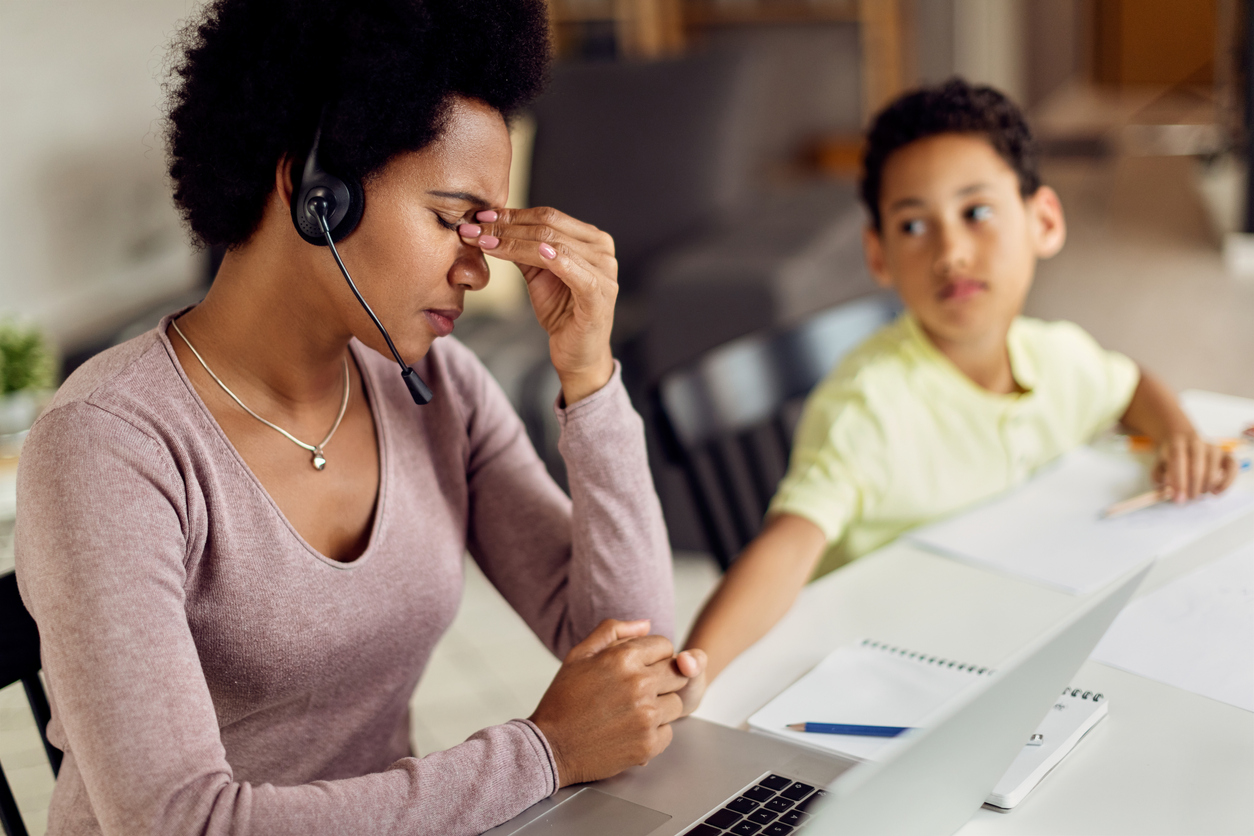Pandemic Stress: It’s Effect on Parents, Kids and Everyday Life

Seeing the light at the end of the pandemic tunnel has brought us hope of returning to some kind of pre-COVID normal. However, the stressors of the past year seem ongoing and parents are feeling the effects of multiple roles – breadwinner, caretaker, teacher, family hero.
Monarch’s Director of Psychology Amanda Matthews, M.A., LPA, HSP-PA, explains that during the pandemic that parents have taken on a variety of roles. “We have experienced changes in our roles and in our expectations,” Matthews explained. “Changes mean additional expectations. Expectations mean additional stress. It really means a whole lot of extra things to do and still only 24 hours left to do it.”
Why do I feel this way?
A body’s reaction to stress, especially during the pandemic, can include increased anxiety, depression, feelings of confusion and mood swings. Matthews pointed out that these stress reactions can turn into legitimate physical symptoms such as stomach and head ailments. “Women everywhere are talking about not feeling themselves. They are feeling like their hormones are out of check,” she described.
Working remotely from home has caused parents to feel that their personal, family life is blurred with their career, Matthews explained. “There is no one telling us that we need to stop work now. There is no one telling us that it is time for the kids to go to school. There is no one telling us that it is time for the kids to finish homework. Everything is up in the air at times,” she said.
Both moms and dads are feeling like something is physically or mentally wrong as a result of the increased stress during the pandemic. “We are seeing a lot of individuals coming to us saying, ‘I don’t know what is wrong but I just know something is wrong,’” Matthews shared.
What is wrong with me?
Virtual therapy services through telehealth has assisted providers in continuing to offer individuals mental health services in a safe, confidential way during the pandemic.
“We can route individuals to a psychiatrist who is able to ask them about certain symptoms and perhaps get medication support. There are all types of different strategies and it doesn’t necessarily mean long-term therapy or support,” she said, adding that searching online or through social media groups offers an outlet during times of isolation.

Amanda Matthews
Pandemic’s Effects on Kids
Young children, adolescents and teens sense something is different and that everyday life has changed. Matthews suggested to be on the watch for complaints of stomach or headaches and general not feeling well complaints.
“We have to understand that just as we miss the normalcy that we experienced in the past they are experiencing a lot of change as well. They miss their friends. They miss school,” she reminded. “They miss the normalcy of schedules and what they are used to.”
As a parent, Matthews said you may feel like you don’t have the answer to all of their questions so it becomes important to both you and your child to reach out for help and get support when needed.
Give Yourself Grace, Space and Slow Down the Pace
Self-care has been a popular piece of advice to parents and Matthews advises to give yourself and others grace, give yourself space and to also slow down the pace of life.
“The pandemic has caused a lot extra stress on everyone. So, when you are attending that online meeting and you feel like for once you are on top of your game but you see that a coworker may not necessarily be feeling that way, take notice. Your colleague could really be struggling and not be showing any symptoms. So certainly give some grace,” she said as a way of offering others support.
She suggested forms of self-care to include discovering new hobbies or resuming ones of interest, exploring outdoor or online activities, as well as keeping in regular virtual contact with friends and family. “Be able to give yourself space to reach out to others or give yourself personal space to disconnect. Disconnect from media,” she suggested, adding that not everything is going to get done in a day and to set realistic expectations.
The Pandemic Silver Lining
The pandemic has opened the door to increased conversation about mental health, focusing on the positive and taking care of ourselves while also looking out for others. “Reach out to people and volunteer. Reach out to the elderly and let them know they are not alone. Doing something for others actually gives us good endorphins. It gives us a good feeling to realize that we can start again. We can cope,” Matthews suggested.
Matthews said that if you experiencing more bad days than good and you are not feeling like yourself, it might be time to seek mental health help: “If you’re feeling down, upset, not yourself more days than not, it is OK to reach out. Mental health stigma is fading with the times and we can recognize that we need support as a community. It is a wonderful thing to reach out for help because it will also help our family and friends in the long run.”
Anyone who is experiencing difficulty during the pandemic or who would like to seek mental health services, please contact Monarch at (877) 272-7826.
We Are Here to Help
Please call us if you want to find out more about the services available in your area.
Or, if are you interested in finding out information on mental health topics such as depression, anxiety, suicidal ideation or attention-deficit / hyperactivity disorder, we have several resources available for download by filling out this form.
Looking for Resources?
Fill out this short form to download available resources.
Posted on: Thursday May 6, 2021
